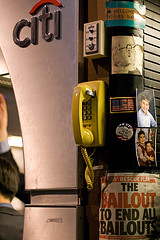SEC Would Rather Fight Judge Than Try To Win A Real Victory Over Citigroup
Back in November, a U.S. District Court judge in Manhattan rained all over the Securities and Exchange Commission’s Thanksgiving parade when he refused to sign off on the regulator’s $285 million settlement with Citigroup because — as is usual in these sorts of deals — the bank neither admitted guilt nor defended itself. But rather than take the judge’s decision as an impetus to push harder on Citi, the SEC reportedly just wants the court to stop being such a wet blanket and let it have its settlement already.
According to the Wall Street Journal, the SEC’s enforcement staff is expected to recommend that the agency vote to appeal the judge’s decision, in which the court stated the $285 settlement is “neither fair, nor reasonable, nor adequate, nor in the public interest” and is “pocket change” compared to the amount actually lost by investors.
One of the main reasons the judge blocked the settlement is that, like almost all such agreements between regulators and big businesses, nothing was actually entered into evidence, meaning he was to rule on the case without having heard either party’s side.
Since this is so standard, the Journal reports that the folks at the SEC are now gun-shy about moving forward on other settlements until, well… until this matter is settled.
“Everything’s come to a halt because the SEC doesn’t know what to ask for anymore in the settlements,” one source tells the paper.
In appealing the case, the SEC could go over the judge’s head and straight to the Second Circuit Court of Appeals.
Some experts say that such an appeal could have a larger impact. If the judge’s ruling is upheld, the decision could be set a precedent for other courts around the country to follow. And if the SEC succeeds, it could validate the whole “guilty but don’t have to admit squat” thing.
If the SEC doesn’t appeal, it could also refile the case as an administrative proceeding, taking it out of the courts entirely.
Barring either of these options, the case is currently slated for trial in mid-July.
Over at ProPublica, Jesse Eisinger makes the case for pushing the matter before the courts:
To overcome its greatest fear, the S.E.C needs to realize that it can win even if it loses. A trial against a big bank could be helpful regardless of the outcome. It would generate public interest. It would put a face on complex transactions that often are known only by abbreviations or acronyms. Litigation would cost the bank money, too. And it could cast the way Wall Street does business in such an unflattering light that even if the bank won, it might bring about better behavior.
SEC Cops Want to Fight U.S. Judge [WSJ.com]
Needed: A Cure for a Severe Case of Trialphobia [ProPublica]
Want more consumer news? Visit our parent organization, Consumer Reports, for the latest on scams, recalls, and other consumer issues.


